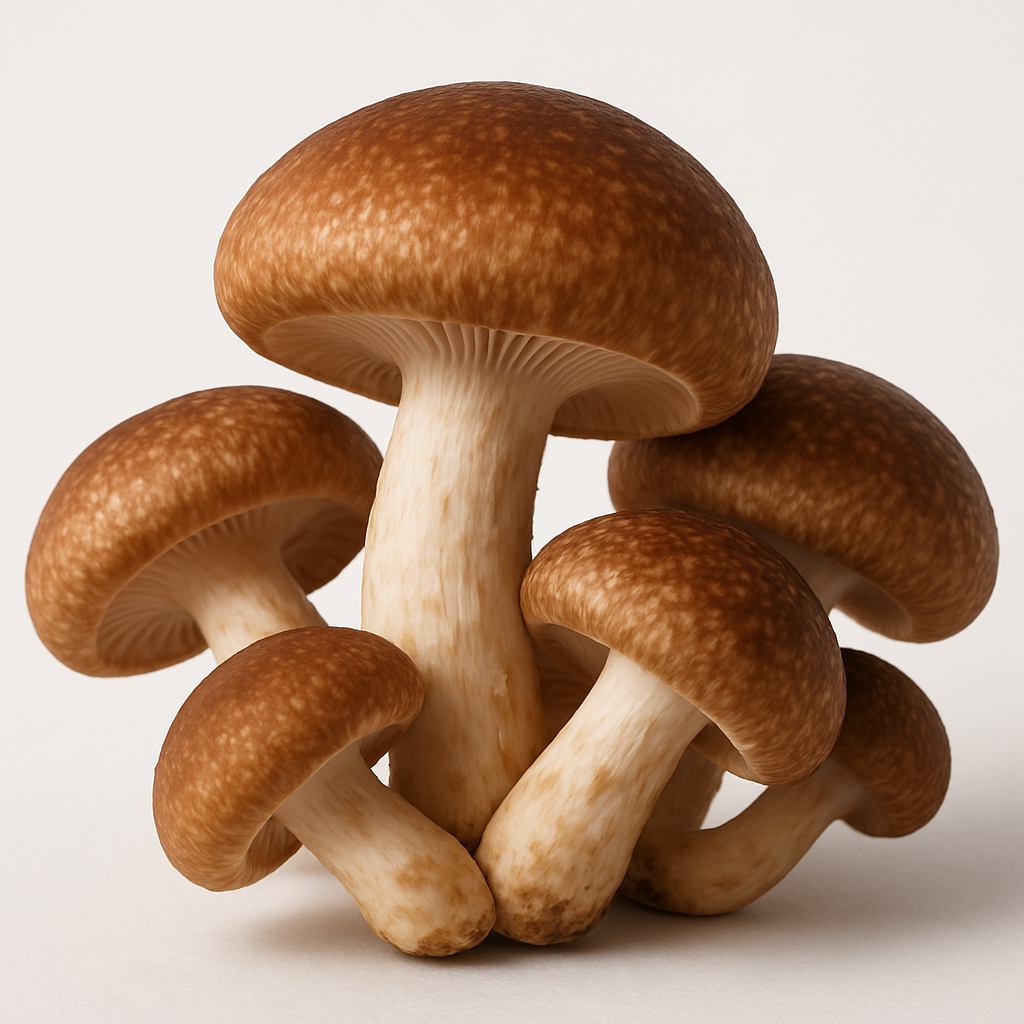Shiitake (Lentinula edodes): The Medicinal and Culinary Marvel
Introduction
Shiitake (Lentinula edodes) is one of the most popular and widely cultivated edible mushrooms in the world. Native to East Asia, this fungus is known for its rich, savory flavor and its impressive range of health benefits. Shiitake mushrooms have been a cornerstone of Asian cuisine and traditional medicine for centuries, and today, they are embraced globally for both their culinary and medicinal properties.
Botanical Description
Shiitake mushrooms belong to the family Marasmiaceae. They typically grow on hardwood trees, especially oak, beech, and chestnut. The cap is brown and umbrella-shaped, often with a slightly curled edge and a firm, meaty texture. The gills are white to cream-colored and run down a short, fibrous stem. While wild varieties exist, most commercial shiitake mushrooms are cultivated on logs or sawdust blocks.
Culinary Uses
Renowned for their umami flavor, shiitake mushrooms are a favorite in stir-fries, soups, sauces, and stews. They can be used fresh or dried—the dried version offering a more concentrated taste. Popular dishes include:
-
Miso soup with shiitake
-
Shiitake stir-fry with tofu or vegetables
-
Shiitake risotto
-
Stuffed shiitake caps
Shiitake mushrooms are also a common meat substitute due to their chewy texture and depth of flavor.
Nutritional Profile
Shiitake mushrooms are low in calories and rich in essential nutrients. They are a good source of:
-
B vitamins (especially B5 and B6)
-
Vitamin D (when exposed to sunlight)
-
Dietary fiber
-
Copper, selenium, and zinc
They also contain several bioactive compounds, such as eritadenine, lentinan, and beta-glucans, which contribute to their health-promoting effects.
Medicinal Properties
Shiitake mushrooms have been used in traditional Chinese and Japanese medicine for centuries. Modern science supports several of their health benefits:
-
Immune Support: Beta-glucans and lentinan boost immune function and may help the body resist infections.
-
Heart Health: Eritadenine can lower cholesterol levels by affecting how the liver processes fats.
-
Anti-Cancer Properties: Lentinan has been studied for its potential to enhance the efficacy of cancer treatments and improve survival rates.
-
Antimicrobial Effects: Extracts have shown activity against bacteria, viruses, and fungi.
Cultivation
Shiitake mushrooms are cultivated worldwide, with Japan and China being the largest producers. Cultivation can be done via two main methods:
-
Log Cultivation: Involves inoculating hardwood logs with shiitake spores—a traditional and time-consuming method with high-quality yields.
-
Substrate Blocks: Modern cultivation uses sawdust blocks enriched with nutrients and offers faster and more controlled growth.
Environmental Impact
Shiitake farming, particularly log cultivation, is relatively sustainable when managed correctly. It makes use of forest byproducts and can be integrated into agroforestry systems.
Conclusion
Shiitake mushrooms are much more than a flavorful ingredient—they are a powerhouse of nutrition and health benefits. As interest in functional foods grows, shiitake continues to play a key role in bridging the gap between food and medicine. Whether enjoyed in a savory dish or taken as a supplement, Lentinula edodes offers a perfect blend of flavor, tradition, and wellness.

